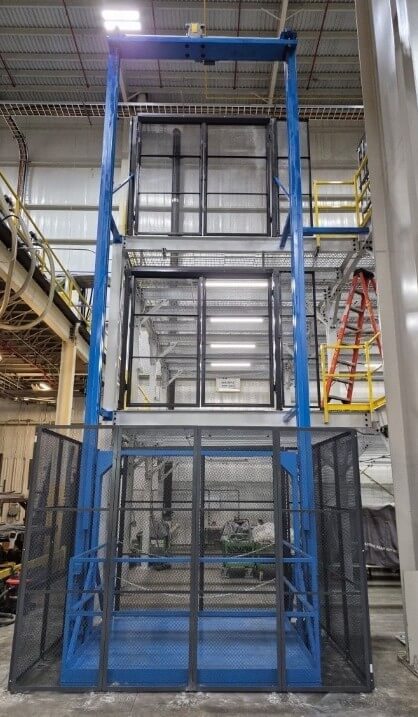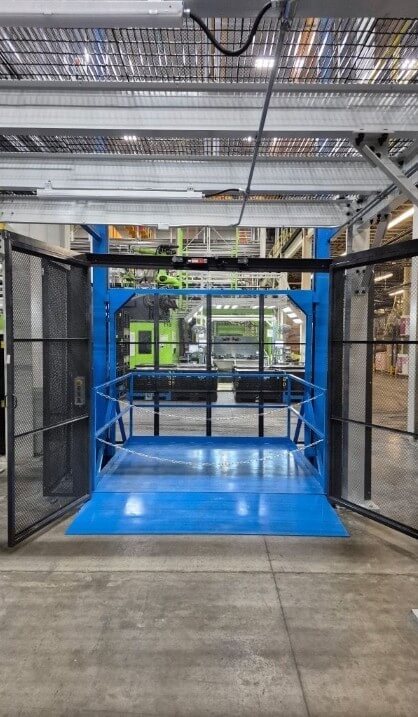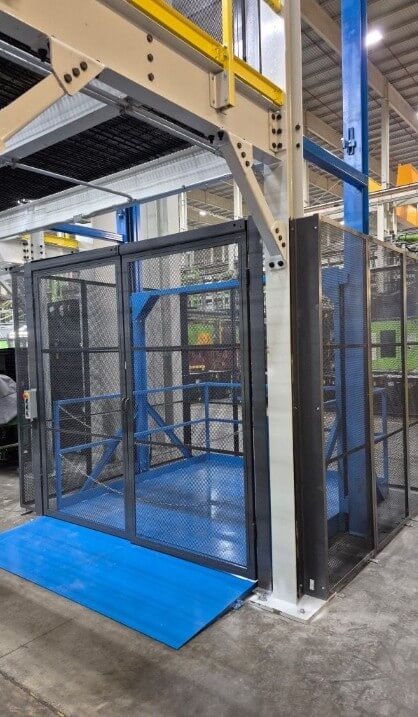

Adding a mezzanine lift provides many benefits that can transform your warehouse operations. Here are some of the reasons to consider installing a lift.
Maximizing available space is a priority for any warehouse. By integrating a mezzanine lift, you can efficiently move materials to upper levels, freeing up ground-level space for other operations.
Utilizing more space keeps workflows organized, with designated areas for storage, production, or sorting. A mezzanine lift ensures smooth material movement between these zones, maximizing the utility of your entire warehouse footprint.
Time is a valuable commodity in warehouse operations. Relying on manual methods like staircases or forklifts to transport goods between floors can create bottlenecks and slow workflows.
A mezzanine lift eliminates these inefficiencies by providing direct and fast material transport. Whether you’re moving heavy loads or numerous smaller units, a lift reduces the time spent on these tasks. You can use this time to focus on higher-priority activities, ultimately increasing overall productivity.
Safety is a significant concern in warehouse environments. Without proper tools for material transport, you put employees at risk for injuries caused by heavy lifting, accidents involving improper equipment use, or unsafe conditions.
A mezzanine lift minimizes risks by serving as a safer alternative to forklifts or manual labor. With safety features such as enclosures, sensors, and controlled movement, these systems transport materials efficiently and securely. This reduces the likelihood of workplace injuries and associated costs.
Managing the consistent flow of materials is easier with a mezzanine lift. Instead of relying on labor-intensive methods, a lift automates the process, making it more streamlined and effective.
A mezzanine lift can handle a wide range of materials, from bulky equipment to delicate merchandise. Adjustments in platform size and load capacity allow for customization, which allows you to tailor the equipment to meet your facility’s specific needs.
One of the primary advantages of mezzanines is their ability to capitalize on vertical space. A lift complements this setup, proving the added levels can be as functional as the ground floor.
Instead of letting overhead mezzanines function solely as static storage, adding a lift transforms these areas into parts of the warehouse you can actively use. This multiplies the facility’s usable space and boosts productivity.
The need for a mezzanine lift depends largely on your facility’s specific demands. The following key indicators suggest it’s time to invest in this solution.
If your warehouse frequently moves high volumes of inventory between levels, you'll benefit greatly from a mezzanine lift. Manual processes become too time-consuming and are prone to errors, particularly during peak activity periods.
A lift provides consistency and speed, moving goods efficiently without delay. This is particularly valuable in industries where rapid fulfillment is critical to customer satisfaction.
When dealing with heavy materials, relying on forklifts or physical labor can pose risks to employees and equipment. Tasks that require moving large or unwieldy items between levels become easy with a mezzanine lift.
With the ability to handle substantial weight capacities, these lifts remove the need for risky manual lifting or excessive use of machinery that wasn’t designed for vertical transport. For warehouses moving loads like large-scale electronics or industrial components, a lift is a must-have installation.
Warehouses experiencing frequent backups or delays in material flow also benefit from mezzanine lifts. These holdups can slow productivity and increase frustration among employees. If you experience issues with conflicting workflows or inefficient layout, a mezzanine lift can help resolve some of these situations.
Lifts offer a structured and efficient solution, alleviating bottlenecks and keeping operations running smoothly. Adding one to your mezzanine setup ensures your facility works at optimal capacity, even in high-demand situations.
Before integrating a mezzanine lift into your warehouse, there are several factors to evaluate to ensure the solution aligns with your operational needs and constraints.
Mezzanine lifts vary in price depending on their load capacity, design, and technology. While this is an upfront investment, assessing the long-term cost benefits is essential. Increased efficiency, reduced labor costs, and improved safety often offset the initial expense. Conducting a cost-benefit analysis will help you determine the return on your investment. Browse a wide range of lift options, sizes, and styles to find one that works within your business’s budget.
The layout and available space in your warehouse will influence the type of mezzanine lift you can install. Consider factors such as ceiling height, proximity to work areas, and the pathways needed for smooth operations. Fitting the system into your facility’s existing design ensures optimal functionality and safety.
Installing a mezzanine lift requires adherence to local regulations and safety guidelines. Compliance will help avoid legal complications and ensure the safety of your employees.
Work with an experienced provider, such as Pantero, who understands these requirements and conducts thorough inspections during installation. We can help ensure safe lift installation as well as other warehouse safety compliance guidelines such as mezzanine railings and more. Regular maintenance ensures that the lift continues to operate safely and efficiently.

